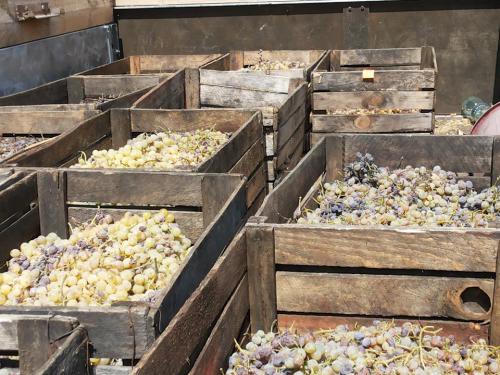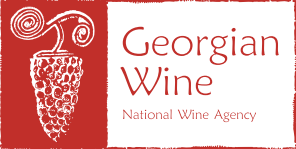
Aleko Tskitishvili
The grape harvest in Kakheti has started unusually early this year due to a three-month drought – the natural disaster that has had devastating effects on the crop of the region. In previous years, the grape harvest used to start towards the end of August, the villages of Kiziki region being the first to bring in their grapes. Outer Kakheti harvest was one of the latest, with picking allowed to start as late as mid-October. This year, however, the villages of Gurjaani and Telavi Municipalities have started their harvest in late August – early September.
It has been the second year after the return of Georgian wines to the Russian market – the fact that has helped ease the tension and complete grape harvests without protests in Kakheti. This year, however, the vine-growers have attempted to protest against a presumable stratagem of the wine companies, which has lead to Saperavi price reduction by 0.50 GEL. In the beginning of the harvest, the cost of Saperavi was 2,20 GEL per kilogram, which unexpectedly, went down to 1.50 GEL during the first week of September. This fact has caused a great dissatisfacion of the vinegrowers in the village of Vazisubani of Gurjaani Municipality.
National Wine Agency has released an official statement on the vinegrowers’ protest stressing the fact that “the time, when the government intervened in the harvest process, determined the grape price and competed with the private sector, is over. The state will no longer ragulate the price. The prices are to be regulated by a free market.”
Despite the announcement, the govenrment has still been involved in the grape price regulation this year and has subsidized the companies during the harvest period. According to the state order N1407 of August 7, 2014, about the “Harvest Aid Practices,” National Wine Agency has been obliged to give wine companies the subsidies of the following amount: 0.35 GEL for Rkatsiteli, 0.35 GEL for Kakhuri Mtsvane and 0.15 GEL for Saperavi grapes, in order to help the vinegrowers, i.e., the physical persons in the Kakheti region, sell their grapes.
Even if there were no government subsidies, the grape prices in Kakheti would still be higher compared to previous years. The return of Georgian wines to the Russian market has caused wine companies to become more active. In addition to this, there has been a long time lack of consensus among these companies because of the fierce competition and therefore, it has taken only several days for the Saperavi price to rise from 1 GEL up to 3 GEL per kilogram. For sure, the price of Saperavi that has been previously proposed by the government – 0.15 GEL per kilogram – is fairly minimal, not to mention that National Wine Agency has had a good chance of allowing free market to regulate the price of the grapes this year.
The tendency to equalize the prices of red and white grapes has also changed this year. The wine companies purchased Rkatsiteli from vinegrowers for 1.20 GEL and Mtsvane Kakhuri grapes for 1.50 GEL per kilogram. As to Saperavi, initially, it was sold for 2.20 GEL, later the price went up to 2.50 GEL and during the second week of September, the price went up again even higher to 3 GEL per kilogram. This kind of unprecedented rise of the Saperavi grape price is linked, on one hand, to this year’s drought, which has caused a shortage of this varietal and on the other hand, to the growing popularity of red (mostly semi-sweet) wines on the Russian market.
The wine companies make different evaluations on the 2014 vintage, on the quality of grapes and the overall tendencies, mostly depending on the subregion of Kakheti, in which their vineyards are located. However, they all have had one common issue this year – the drought and unprecedentedly early harvest. The winemakers say the drought has greatly reduced the amount of crop, however, the quality of grapes still allows to make quality wines this year.
Merab Matiashvili’s family cellar owns vineyards in the Jugaani village of Sighnaghi Municipality. A very famous PDO wine – “Tibaani” was once produced in this prominent micro-zone. Even though Merab Matiashvili is a novice, Japanese distributors have already become interested in his wines. He has received half of the crop this year, however, the quality of grapes is good, as he says, and if the winemaking process goes well, the result will be the wine of excellent quality. He harvested the grapes on September 5.
The “Shumi” Company has vineyards in three Municipalities of Kakheti region – Telavi, Gurjaani and Kvareli and produces PDO wines – “Tsinandali,” “Mukuzani” and “Kindzmarauli” from its crop. According to Akaki Tsopurashvili, the General Director, “the harvest has started unusually early in all three municipalities due to the unusual drought.” They started picking grapes on September 1 in Napareuli. On September 5, Kvareli was the second region where the company continued crop harvesting, Mukuzani and Tsinandali being next to bring in the grapes. For the sake of comparison: In previous years, “Shumi” usually had its first harvest in Napareuli in the mid September, sometimes even towards the end of the month.
The vineyards of “Kindzmarauli” corporation are mainly located in Kvareli, including the Kindzmarauli micro-zone. The company purchases grapes from the vinegrowers of other Kakhetian regions as well. The company started its harvest during the first week of September. It will produce a table wine – “Alaznis Veli” from the grapes that have been picked during this period. The harvest of the grapes, which are going to be used for the production of the company’s red dry PDO wine – “Kvareli” – will start on September 15. Later, towards the end of September, they will start cropping Saperavi varietal from which a semi-sweet red PDO wine – “Kindzmarauli” will be made.
Nugzar Ksovreli, the General Director of “Kindzmarauli” corporation: “Our harvest lasts for a month as usual and this year will be no exception, despite the fact that we have started cropping the grapes much earlier compared to previous years. This has been a difficult year – even the winter has been unseasonally dry. The spring has been more or less rainy, however, the overall rainfall has not been enough to fill the gap caused by the drought. July and August have been entirely dry and extremely hot. Indeed, one should mention that the drought has not been severe enough to stop the growing process of the grapes. The grapes have accumulated the desired sugar level, however, this doesn’t mean that we should start picking those grapes. We are still waiting for the pips and stalk to ripen in Kvareli and for the grapes to achieve the desired acidity level as well as expect the sugar level to rise in the grapes, from which “Kindzmarauli” wine will be made.”
The familial cellar of Beka Gotsadze plans to start its harvest in the mid September. It produces Kakhetian wines from the vineyards located in Babaneuri village of Akhmeta Municipality. As Beka Gotsadze stated, the grapes have ripened early because of the drought and they will have crop harvesting two weeks earlier compared to previous years.
The region harvest will traditionally end in the outer Kakheti. Here, the grapes are being picked a month earlier in contrast to previous years. As Malkhaz Jakeli, a winemaker at Jakeli Wines stated, the company will start picking Saperavi on September 20 in the village of Kashmi: “ I’ve never had harvest this early. We would usually pick Saperavi grapes in the middle of October and sometimes even towards the end of October. Even though the spring has been rainy, still the summer drought has caused the grapes to ripen earlier than usual. This year has also been different in a way that we haven’t been bothered by vine deseases. Therefore, the grapes are healthy and we’ll be able to make excellent wines from them.
As the vinegrowers have observed, the drought has had various effects on Georgian grape varieties. This has been especially obvious in the vineyards of rare grape varieties in Bakurtsikhe, grown by the Wine Club and Georgian Vine Fund. At the end of August, several varietals –Khikhvi, Mtsvane Kakhuri and Ghvinis Tetri – have accumulated such high sugar level that the vinegrowers decided to make dessert wines from these grapes. Dry and hot weather has harmed Mtsvane Kakhuri the most, probably because of its relatively thin skin. The berries of Saperavi Budeshurisebri and Saperavi have also been qdried. It has been hard for Kakhuri Mtsvivani as well. Rkatsiteli and Kisi turned out to be less suspectible to drought. Rkatsiteli Rose looked its best compared to other varietals, which suggests that this grape has a great potential for late harvest.
Overall, the drought has greatly affected the amount of harvest as well as the quality of it in Kakheti region. Hail has also hit several villages at different times of the year. However, hail has not been the main topic of 2014 vintage. There are ongoing negotiations between the government and insurance companies to determine how to insure vineyards against hail and natural disasters. The negotiation will likely bring particular results. Still, what we can say for sure is that the vineyards worldwide are never insured against drought and Georgia will be no exception either. The thing is that the insurance companies could not able to evaluate what kind of effects the drought had on the crop and whether the crop loss could be prevented if the vineyards had been watered.
Thus, all we can do for now is to wish Kakhetian vinegrowers a reasonable weather, the vineyards insured against hail and other natural disasters and fruitful harvests in coming years.
© Georgian WIneclub/vinoge.com






